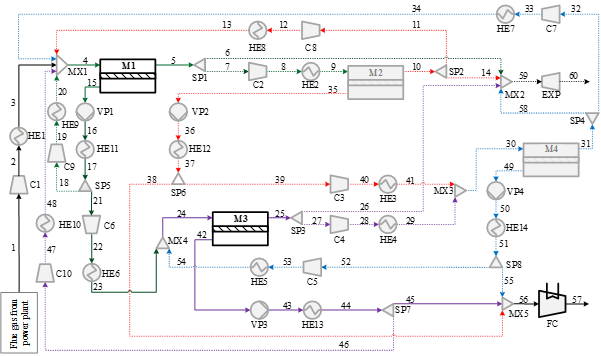Optimizing Membrane-Based CO2 Capture Technologies for Industrial Applications

Related Publications:
[1] Ana M. Arias, Nicolás J. Scenna, Patricia L. Mores, 2023. Membrane superstructure optimization for carbon capture from cement plants. Water content influence on optimal solution, Int. J. Greenh. Gas Control 129. https://doi.org/10.1016/j.ijggc.2023.103964.
[2] Mores, P.L., Arias, A.M., Scenna, N.J., Mussati, M.C., Mussati, S.F., 2019. Cost-based comparison of multi-stage membrane configurations for carbon capture from flue gas of power plants. Int. J. Greenh. Gas Control 86, 177–190. https://doi.org/10.1016/j.ijggc.2019.04.021
[3] Arias, A.M., Mores, P.L., Scenna, N.J., Caballero, J.A., Mussati, S.F., Mussati, M.C., 2018. Optimal Design of a Two-Stage Membrane System for Hydrogen Separation in Refining Processes. Processes 6, 208. https://doi.org/10.3390/pr6110208
[4] Mores, P.L., Arias, A.M., Scenna, N.J., Caballero, J.A., Mussati, S.F., Mussati, M.C., 2018. Membrane-Based Processes: Optimization of Hydrogen Separation by Minimization of Power, Membrane Area, and Cost. Processes 6, 221. https://doi.org/10.3390/pr6110221
[5] Arias, A.M., Mussati, M.C., Mores, P.L., Scenna, N.J., Caballero, J.A., Mussati, S.F., 2016. Optimization of multi-stage membrane systems for CO2 capture from flue gas. Int. J. Greenh. Gas Control 53, 371–390. https://doi.org/10.1016/j.ijggc.2016.08.005
[6] Arias, A.M., Mores, P.L., Scenna, N.J., Mussati, S.F., 2016. Optimal design and sensitivity analysis of post-combustion CO2 capture process by chemical aabsorption with amines. J. Clean. Prod. 115, 315–331. https://doi.org/10.1016/j.jclepro.2015.12.056